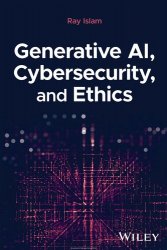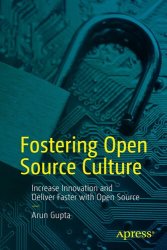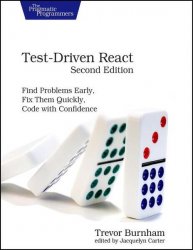 Название: Generative AI, Cybersecurity, and Ethics
Название: Generative AI, Cybersecurity, and EthicsАвтор: Ray Islam
Издательство: Wiley
Год: 2025
Страниц: 364
Язык: английский
Формат: pdf (true), epub
Размер: 10.1 MB
Equips readers with the skills and insights necessary to succeed in the rapidly evolving landscape of Generative AI and cyber threats.
Generative AI (GenAI) is driving unprecedented advances in threat detection, risk analysis, and response strategies. However, GenAI technologies such as ChatGPT and advanced deepfake creation also pose unique challenges. As GenAI continues to evolve, governments and private organizations around the world need to implement ethical and regulatory policies tailored to AI and cybersecurity.
Generative AI, Cyber Security, and Ethics provides concise yet thorough insights into the dual role artificial intelligence plays in both enabling and safeguarding against cyber threats. Presented in an engaging and approachable style, this timely book explores critical aspects of the intersection of AI and cyber security while emphasizing responsible development and application. Reader-friendly chapters explain the principles, advancements, and challenges of specific domains within AI, such as Machine Learning (ML), Deep Learning (DL), Generative AI, data privacy and protection, the need for ethical and responsible human oversight in AI systems, and more.
Machine Learning (ML) thrives on the fascinating idea that machines can acquire knowledge and adapt through experience. Utilizing statistical methods, ML algorithms enable computers to learn from data, identify patterns, and make decisions with minimal human oversight. This aspect of AI harbors tremendous potential. Essentially, ML is defined as the capacity of a computer program to continually improve its performance on a specific task through accumulated experience. Mitchell’s definition provides a foundational understanding of ML: it emphasizes continuous, iterative enhancement rather than mere initial programming. For example, a spam filter progressively refines its ability to distinguish between “spam” and “nonspam” by analyzing various email contents and user responses, thereby increasing its indispensability in our digital ecosystem.
Deep Learning, inspired by the structure and function of the human brain, particularly ANNs, stands as a captivating subclass of ML. These algorithms autonomously learn complex data representations from images, videos, and text, eschewing rigid programming frameworks. The depth of Deep Learning, with its multiple interconnected layers mimicking neurons, allows it to grasp intricate data representations. In computer vision, convolutional neural networks have achieved notable success, while natural language processing (NLP) has undergone a revolution with models like the Transformer, introduced by Vaswani et al. in “Attention is All You Need,” leading to innovations such as OpenAI’s GPT series. Deep Learning also revolutionizes autonomous vehicles by processing vast sensory data for real-time decision-making, with companies like Tesla and Waymo leveraging deep neural networks to boost vehicle agility and safety.
Generative AI, or GenAI, represents a significant leap forward in AI, enabling machines to create new content—from text and images to music and code—by leveraging learned patterns and data. This technology utilizes sophisticated algorithms and neural networks to grasp and mimic the structure and nuances of various data types. For instance, in the realm of NLP, Generative Pretrained Transformer (GPT) models are capable of composing essays, crafting creative fiction, or even generating code, emulating human-like writing styles. Similarly, in the field of visual arts, models such as DALL-E can generate images from textual descriptions, artfully combining specified elements to forge novel artworks or design concepts.
Cybersecurity, or information technology security, emerges as an indispensable safeguard for computers, servers, mobile devices, networks, and data against malicious attacks and unauthorized intrusions. It serves to preserve the confidentiality, integrity, and availability of digital assets, spanning areas such as network security, application security, and endpoint security. In the increasingly technologically driven world of today, the growing sophistication of cyber threats renders robust cybersecurity measures essential for both organizations and individuals. By implementing effective cybersecurity practices, entities can mitigate risks, protect sensitive information, and uphold trust. The landscape, ever evolving, demands continuous vigilance, regular updates to security protocols, and an ongoing awareness of emerging cyber threats.
Incorporating numerous real-world examples and case studies that connect theoretical concepts with practical applications, Generative AI, Cyber Security, and Ethics:
Explains the various types of cybersecurity and describes how GenAI concepts are implemented to safeguard data and systems
Highlights the ethical challenges encountered in cybersecurity and the importance of human intervention and judgment in GenAI
Describes key aspects of human-centric AI design, including purpose limitation, impact assessment, societal and cultural sensitivity, and interdisciplinary research
Covers the financial, legal, and regulatory implications of maintaining robust security measures
Discusses the future trajectory of GenAI and emerging challenges such as data privacy, consent, and accountability
Blending theoretical explanations, practical illustrations, and industry perspectives, Generative AI, Cyber Security, and Ethics is a must-read guide for professionals and policymakers, advanced undergraduate and graduate students, and AI enthusiasts interested in the subject.
“Generative AI, Cyber Security, and Ethics' is an essential guide for students, providing clear explanations and practical insights into the integration of generative AI in cybersecurity. This book is a valuable resource for anyone looking to build a strong foundation in these interconnected fields.” - Dr. Peter Sandborn, Professor, Department of Mechanical Engineering, University of Maryland, College Park
“Unchecked cyber-warfare made exponentially more disruptive by Generative AI is nightmare fuel for this and future generations. Dr. Islam plumbs the depth of Generative AI and ethics through the lens of a technology practitioner and recognized AI academician, energized by the moral conscience of an ethical man and a caring humanitarian. This book is a timely primer and required reading for all those concerned about accountability and establishing guardrails for the rapidly developing field of AI.” - David Pere, (Retired Colonel, United States Marine Corps) CEO & President, Blue Force Cyber Inc.
Скачать Generative AI, Cybersecurity, and Ethics
[related-news] [/related-news]
Комментарии 0
Комментариев пока нет. Стань первым!














